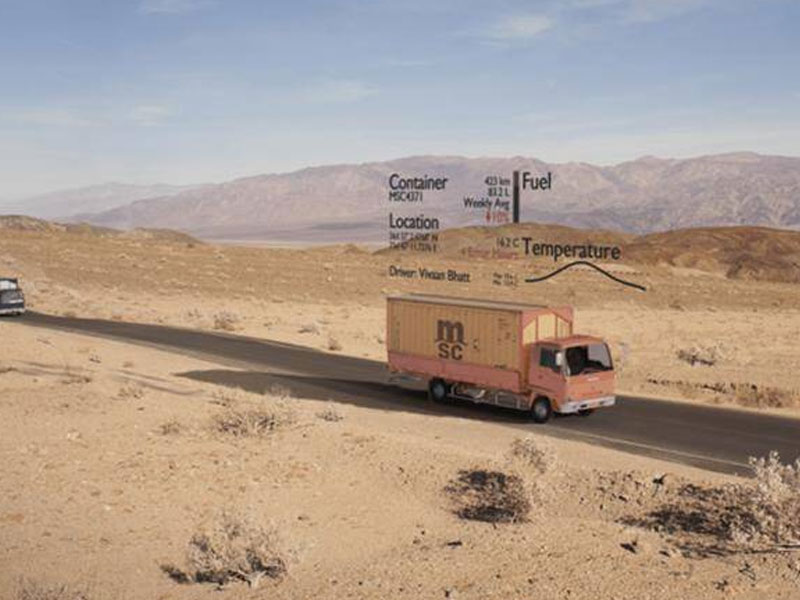Tech Mahindra launches a sports cloud platform built on AWS to provide an immersive fan experience globally
SOURCE: HTTPS://WWW.MAHINDRA.COM/
NOV 27, 2023
Boosting logistics: The IoT way
SOURCE: FINANCIALEXPRESS.COM
SEP 18, 2021

In a flat world, a concept made famous by Thomas L Friedman in his analysis of globalisation, the global supply chain remains constant in our lives, keeping corporations productive, industries competitive and economies running.
The thesis holds true for today’s global economy, and the ‘flat world’ metaphor explains the level-playing field for individual entrepreneurs and companies that are a part of a large, complex, global supply chain extending across oceans and continents. Globalised technologies, such as the Internet of Things (IoT), have enabled international business competitiveness and collaboration.
The traditional logistics industry has suffered, marred by the era of delays, misrouted goods, lower productivity and market relationships replete with uncertainty. At the same time, this industry has been a forerunner in adopting technologies, with an emphasis on driving operational efficiencies, mitigating business vagaries and lowering costs—while delivering greater, more transparent and up-to-the-minute customer service.
Moving from manual to digital, data-driven processes
The emergence of a ‘connected’ digital world, with technologies such as cloud computing, predictive analytics, AI and IoT, has significantly accelerated the digital transformation of the global logistics and transportation industry.
The adoption of IoT, accelerated due to Covid-19, has brought in increased efficiency and transparency, through regular monitoring of fleet operations, predictive analysis for route management and delivery status transparency to the customer. From the procurement of raw materials, components and parts, to keeping an eye on storage conditions and transportation, to fulfilment—supply chain digitalisation has provided transparency to the process.
Take, for instance, India’s trucking industry. For decades, safety, efficiency and reliability of trucking have been limited by a lack of end-to-end visibility across the value chain. The information that could be gathered through manual efforts becomes irrelevant by the time it is available to stakeholders. Nine million truckers and transporters move 69% of freight traffic in India, according to the Economic Survey 2018-19. Government data suggests Indian truck drivers operate in an environment where around 500,000 accidents happen every year, leaving some 150,000 people dead.
To cap that, India’s diverse terrestrial region presents serious challenges to logistics teams seeking to monitor important checkpoints and warning signs en route. With space-based end-to-end IoT solutions available in India through Skylo, customers can deploy real-time fleet and cargo monitoring solutions, providing 100%, always-on visibility of fuel levels, breakdowns, route changes and more, from the palm of their hand.
Trucking is the lifeblood in keeping India’s (any country’s) economy running. Truckers need to keep productivity high, shipping costs low, deliveries predictable and more communicate real-time with customers on the status of goods. There is also an increased focus to make drivers and shipments safer.
There are other examples, too. The past 16 months of the pandemic have resulted in unprecedented issues for the global shipping, transportation and logistics industries, where the fragility of global supply chains was revealed, testing the capabilities of shipping and logistics companies to operate in very difficult conditions.
Manufacturers and logistics companies rallied well, and leveraged existing cellular-based deployments of IoT to have better visibility on their fleet operations, being able to operate at continuously high levels of efficiency and reliability. But when they now want to eke out every penny from their assets and operations, it is only possible when they have 100% visibility of their fleet operations, best achieved via ubiquitous connectivity offered by satellite-based solutions such as Skylo.
Research and Markets has predicted the global IoT market to grow at a 13.2% CAGR during 2020-30, having attained a value of 34,504.8 million in 2019 and predicted to rise to $101 billion by 2030.
Our experience at Skylo tells us that new digital disruptors will drive down the cost of ubiquitous data, crucial for countries such as India and across Southeast Asia where connectivity is a challenge and up-to-the-minute data is scarce. Low-cost and sturdy IoT hubs or hotspots custom-made for the challenging Indian environment can be installed on trucks and other vehicles, while transmitting data seamlessly and without any geographic constraint via narrowband satellite communications.
This is precisely why a well-thought-out IoT-centric digital transformation approach is crucial for India’s logistics industry seeking to modernise itself. Nothing less than 100% availability of data, the best form of communications, will do.
LATEST NEWS
WHAT'S TRENDING


Data Science
5 Imaginative Data Science Projects That Can Make Your Portfolio Stand Out
OCT 05, 2022

SOURCE: HTTPS://WWW.MAHINDRA.COM/
NOV 27, 2023
SOURCE: HTTPS://WWW.IOTTECHNEWS.COM/
OCT 27, 2023
SOURCE: HTTPS://WWW.THEDAILYSTAR.NET/CAMPUS/
OCT 01, 2023
SOURCE: HTTPS://WWW.IOTFORALL.COM/
SEP 11, 2023
SOURCE: HTTPS://WWW.IOTTECHNEWS.COM/
AUG 10, 2023
SOURCE: HTTPS://WWW.SCIENCEDAILY.COM/
AUG 11, 2023